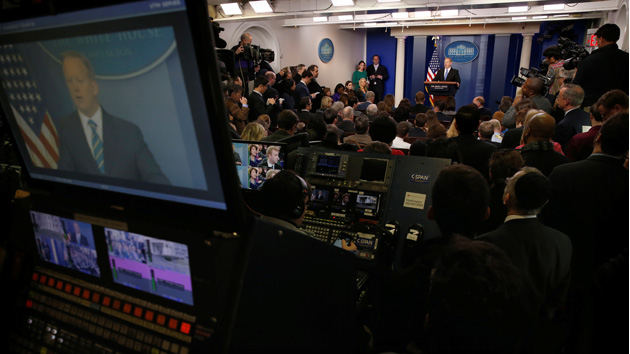
Jonathan Ernst/Reuters via ZUMA
Glenn Thrush and Maggie Haberman have a deeply reported story today about the first two weeks of the Trump presidency, filled with lots of juicy little details. But here’s what leaped out at me. See if you can figure out what ties together these five excerpts:
- Chris Ruddy, the chief executive of Newsmax Media and an old friend of the president’s, said, “I think, in his mind, the success of this is going to be the poll numbers. If they continue to be weak or go lower, then somebody’s going to have to bear some responsibility for that.”
- For a sense of what is happening outside, he watches cable, both at night and during the day—too much in the eyes of some aides—often offering a bitter play-by-play of critics like CNN’s Don Lemon.
- [Steve] Bannon remains the president’s dominant adviser, despite Mr. Trump’s anger that he was not fully briefed on details of the executive order he signed giving his chief strategist a seat on the National Security Council.
- He almost always makes time to monitor Mr. Spicer’s performance at the daily briefings, summoning him to offer praise or criticism, a West Wing aide said.
- To pass the time between meetings, Mr. Trump gives quick tours to visitors, highlighting little tweaks he has made after initially expecting he would have to pay for them himself.
Trump watches lots of cable; he monitors Sean Spicer’s press briefing every day; and he fills up time between meetings by showing off the decor of the White House. He doesn’t seem to be very busy with actual work, does he? And yet, he wasn’t fully briefed on a simple executive order, something that would have taken no more than a few minutes. What’s more, it’s pretty obvious that he’s also signed other executive orders that he barely understands.
This is pretty much what we all expected from Trump, but it’s still jarring to see it confirmed. He spends a lot of time in front of the television, he obsesses about polls, he keeps an eye on the daily press briefing, he seethes with anger at criticism, and he putters around whenever there are no meetings scheduled. In other words, he still thinks he’s the star of a reality TV show. He cares about his image and his ratings, but that’s about it. When it comes to making America great again, he expects his staff to take care of things.













